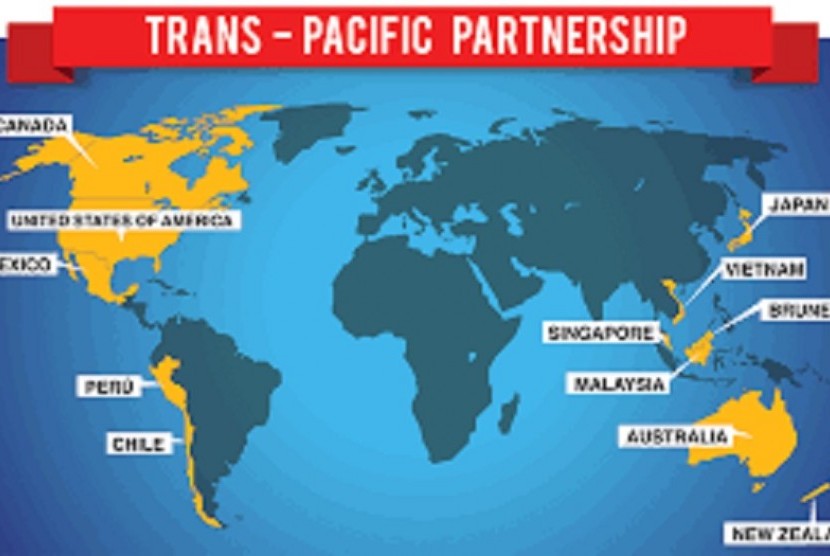REPUBLIKA.CO.ID, By: Toni Ervianto, (Magister from University of Indonesia - UI)
Trans Pacific Partnership (TPP) is a new trade pact in Asia Pacific initiated by the United States which has wrap up by its 12 members (Australia, Brunei Darussalam, Canada, Chile, Japan, Malaysia, Mexico, New Zealand, Peru, Singapore, and Vietnam). The pact now is in ongoing ratification process by its members’ parliament. As for Indonesia that already state its intention to join the pact, that mean Indonesia will later join this partnership at the time that would not be able to revise the agreement that has been agreed. Thus, some parties suggested the government to reconsider whether or not Indonesia joins TPP.
TPP previously was Trans Pacific Strategic Economic Partnership (TPSE). This is indeed a comprehensive, scheduled, and legally binding liberalization scheme for trade of goods and services. This partnership may also contain many dangers as it also covers the issues being discussed in World Trade Organization (WTO) Plus. According to Hendrajit, The Executive Director of Global Future Institute, TPP scheme that begin with demand from about 600 global corporation to US Department of Commerce, will open a greater access to the market around the world including Indonesia.
Indonesia will remain a passive target to be the market for foreign products and investments. Two sectors that might heavily be threatened are health and food. If the intellectual property right is to be implemented in health sector, this will dispel Indonesians’ access to cheap and affordable drugs because the implementation of intellectual rights will grant an authority to omit the flexibility clause in The Agreement on Trade Related Aspects of Intellectual Property Right (TRIPS) in WTO. “Based on TRIPS scheme, many developing countries may develop or create the generics of US patented drugs for public. Same condition goes to food sector,” said Hendrajit.
United States “Unipolar” Trap?
With a very strategic geopolitics, geo-economics, and geostrategic position, Indonesia is well expected by various countries as an “ally”, especially in economic sector. As we know, nowadays there are various economic blocks built by influential countries such as BRICS (Brazil, Russia, India, China, and South Africa), Shanghai Cooperation Organization (SCO) that was established by China in 2001 and assisted by Russia to balance US unipolarity, and Asian Infrastructure Investment Bank (AIIB) that also participate to repress the unipolar domination of US. AIIB will fund infrastructure sector that are required in all civilization groups.
Many people believe that Indonesia is not ready yet to participate because they think that the TPP agreement has deep and wide liberalism aspects. The direct impact should Indonesia join TPP is that Indonesia must agree with the TPP provision that will prioritize developing countries in production and technology cooperation. Besides, another impact is the liberalization of import and export by eliminating fare and export tax which is previously permitted in GATT (General Agreement on Tariffs and Trade). Liberalization in investment sector also means that we can not force the investor to use local content.
In TPP scheme, there is a provision that investors can challenge government policies to investor-State arbitration mechanisms within TPP. This is ultimately against the Investment Act suggesting that should there be any dispute, it should be settled by the investors and government. TPP requires service liberalization by using negative list approach just like in goods investment. By such requirement, foreign businessmen who have intended to invest in certain country must be protected as if they already become investors. Though, Indonesian investment system suggests that those having already invested who will get the protection. Thus, Indonesia has no urgency to join TPP, not to mention that according to trade data with the 12 TPP member countries, 80 percent of total trade are showing negative trend.
According to Nikkei Asian Review, TPP regulations suggest that import tariff for 95 percent of 9,018 imported items must be abandoned; the government can not force foreign companies to reveal the technology as well as seize the companies’ land in inappropriate manner; foreign company can ask for compensation if the government violates the points of agreement; foreign companies are allowed to bid for public projects with a certain budget; patent pharmaceutical products is valid for 5 years; the privilege State Owned Enterprise is limited; members must adhere to the standardization of labor; members must comply with environmental standards; and members must comply with copyright standardization. All these become the threat coming from TPP for Indonesia.
We should realize that in principle TPP is a step by US MNCs to expand their supply chain and market of goods and services that are initially protected by the national law of the targeted countries. Australia, Vietnam, Malaysia, Brunei and Singapore might have interest to join TPP because they are US allies that need supports to deal with China in Spratly Island dispute. On the contrary, Indonesia is different. Our major trade partner is with China then followed by US. The US and Australia until in fact often become the contenders of ASEAN including Indonesia (as a main pivot) especially in the effort of rebalancing US power in Asia Pacific region.
Indonesian government should realize that Indonesia is a great country and act in accordance with that. We must remember that the regionalism we foment is for the sake of our national interest, not other countries’. *


